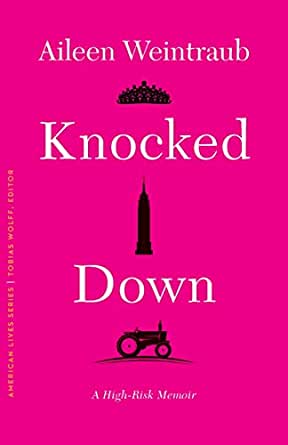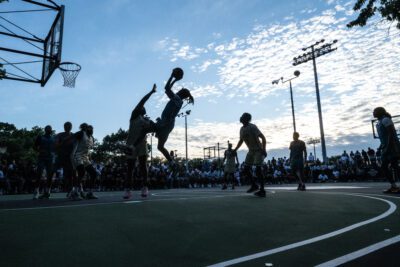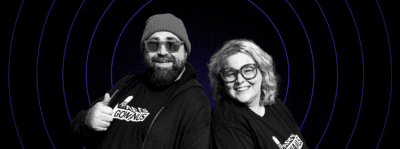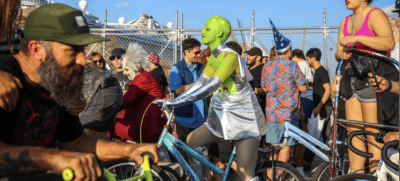Excerpt: ‘Knocked Down: A High-Risk Memoir’
What happens when a commitment-phobic Brooklyn girl finds herself living in a rickety farmhouse, pregnant and on bedrest?
Journalist Aileen Weintraub started out as a commitment-phobic Brooklyn girl who left her Jewish community to move to the wilds of upstate New York. This excerpt of her new memoir (out earlier this month from University of Nebraska Press) finds Weintraub embarking on a stint in AmeriCorps, losing her father and ultimately bailing on Brooklyn. Later, after an unexpected romance, she finds herself living in a rickety farmhouse pregnant and faced with five months of pregnancy-related bed rest. As the farmhouse collapses around her, her marriage does the same. She must make a choice: In her precarious condition, will she stay or will she once again run away from it all?
 I had never considered leaving the city. Surrounded by lunch trucks, orange-and-white steam pipes, and relentless jackhammers, Brooklyn was my home. But after returning from a trip to Alaska, I began longing for the grandness of nature. Without much thought, I left my job as an editor for a children’s publishing company and signed up for an outdoor educational program through AmeriCorps (kind of like Peace Corps lite) with dreams of roaming the wilderness of upstate New York.
I had never considered leaving the city. Surrounded by lunch trucks, orange-and-white steam pipes, and relentless jackhammers, Brooklyn was my home. But after returning from a trip to Alaska, I began longing for the grandness of nature. Without much thought, I left my job as an editor for a children’s publishing company and signed up for an outdoor educational program through AmeriCorps (kind of like Peace Corps lite) with dreams of roaming the wilderness of upstate New York.
On the first day of the AmeriCorps program, I showed up to the trailhead in a pair of bright-red Urban Outfitters corduroys and hiking boots with two-inch platform heels. “Weintraub, you’re going to need to be waterproof. Get yourself some GORE-TEX,” snapped the corps leader, a rugged thirtysomething backwoods boy.
“What’s GORE-TEX?” I whispered to the girl standing next to me. She gave me the once-over and then lifted the collar of her jacket as if that were supposed to clear the whole thing up. The next morning I overheard a discussion about frost warnings and black ice; the former sounded ominous, while I assumed the latter was just country-speak for dirty snow. I was suddenly outside my comfort zone.
By the end of that week, I started to get with the program, rising at dawn for early- morning hikes, donning thermals and trail runners, and tying back my unruly blond curls into a sensible ponytail. By the third week I was slamming my very own pickax against concrete to refurbish a Habitat for Humanity house. The corps leader walked by and whispered in my ear, “You surprised me. Figured you would have flagged down the first Greyhound and hightailed it out of here by now.”
A few weeks later I went home to Brooklyn to visit my family for Rosh Hashanah, wondering if my father was speaking to me. He couldn’t believe I had quit my job “to live in the woods with the freaks,” as he put it. He was livid, and I wasn’t sure where we stood. After returning from morning prayer at our synagogue in Midwood, I sat down on the floor next to him while he watched football, or maybe it was hockey.
“You like it up there?” His cigarette burned a thin thread through the air. “It’s okay.” And that was it. My father was my best friend, and it weighed on me when we disagreed. I was relieved we were past this latest quarrel. That evening, after stuffing ourselves with egg salad, kneidlach, tzimmes, and other holiday fare, I sat on his lap in his Archie Bunker chair while we gathered in the living room. He was soft and rounding with age, and when I placed my head on his shoulder, I could feel his flesh give.
The next morning, before heading back upstate to my Ameri-Corps post, I went into my parents’ bedroom to say goodbye. My mother had left for work, but my father was still sleeping. He always slept on his side with one hand resting under his stubbled cheek. He had a partial grin as though his dreams were lovely. I kissed him on his brow and then gently patted down his too-long, brownish-gray hair, which he always insisted was blond.
A little over a week later, I received a voicemail from my mother that my father needed emergency stomach surgery. No biggie. The stomach isn’t near any major organs. I’d talk to him in the morning. Still, I sat vigil by the phone waiting for word that he was okay. At midnight my mother called again. Everything was fine, she said, but I could sense a commotion in the background. She quickly hung up. I felt sick.
A deep instinct pushed me homeward. I gathered a few corps members to give me a ride back to the city, a four-hour drive in the middle of the night. Cell service didn’t yet exist in that part of upstate New York so I had no way to get updates.
When I arrived my brother opened the door to my family’s two-story brick house. Standing on the red stoop, the same stoop where my father had taught me to button up my crimson faux-fur coat that he had designed himself while working in the garment industry, the same red stoop where he had shown me how to hit a baseball with my plastic bat and years later snuck me my first drag of a cigarette, that was the place where my brother looked at me and sobbed, “He’s dead.” Somehow I had already known. My father had been on blood thinners, and they “just couldn’t get the blood to clot.” An aneurysm, the doctor had said.
It is tradition that Jews bury their own dead. Most of the time, it’s through a symbolic gesture in which each mourner takes a turn shoveling a small amount of dirt over the casket. Whatever is left, the gravediggers complete. “It means we take care of our own,” my mother told us. I was in the front row during the graveside service, and when I turned to take the shovel, I saw that over a hundred people had shown up.
I threw a pile of dirt on my father’s coffin and put the shovel in the ground for the next person. And then I noticed, after each person had taken a turn, instead of going back to their cars, they stayed. They kept shoveling. I looked around at the faces of the friends I had grown up with, their parents, and cousins I hadn’t seen in years. We would do the job ourselves. I climbed to the top of the big dirt mound and began shoveling heavy loads of earth, rain pouring down, streaks of mud not only on my face, but on the faces of all the mourners. This was what it meant to have community. More shovels appeared, perhaps from the gravediggers standing discreetly off to the side. The hole was almost filled, the wet ground devouring the simple maple coffin, when my mother’s shriek pierced the quick cadence of dirt being heaped into the grave. “Wait! I can’t find my keys!” she yelled.
We all stopped and looked at her, then toward the grave. She rifled through her purse. “They may have fallen in!” I looked down at my clothing, my red shirt stained brown. My father’s good friend Paulie, his suit ruined and his yarmulke sliding off his head, stood next to his grown sons, and all were poised to either start digging or continue shoveling. “Okay, okay,” my mother called out, “I found them. Thank God, we don’t have to dig him up. Keep going.” My mother’s friend Zahava came up beside her. “Gail, we’ll get through this together.” And then she wrapped my mother in her arms.
I stayed in AmeriCorps for another two and a half months, trying to pretend it was no big deal, his death. But I cried every night, and familiar Brooklyn was calling me home. I moved in with my mother, who was now alone in a big house, and began focusing on my freelance -writing career.
Then, two months after my twenty-eighth birthday, a little over a year after my father died, I headed back to the country. I wanted to be outdoors again, to hike, to gaze upon fall colors and expansive views. I was born in Brooklyn. I came from Brooklyn, but that borough’s deep vibration of elevated subway cars and flashing neon signs no longer felt right. This time I wouldn’t be heading back to the camaraderie of AmeriCorps. Now I would find my own way.
As I was packing the last of my belongings, standing in my childhood bedroom, I began to understand why my father had been so against my leaving Brooklyn. He didn’t want me to go. It was as simple as that. It wasn’t because he was afraid I’d never make enough money to support myself or that I’d be eaten by bears; it was that he wanted me to stay close to home. I don’t know that it would have stopped me, this knowledge, but it would have made me understand how deeply he loved me. I stood there for a moment longer, forgetting the task at hand. There is a saying that a boy becomes a man when he loses his father. But what about a girl? What does she become?
“Knocked Down” by Aileen Weintraub was published March 1 on University of Nebraska Press. This excerpt first appeared in the winter/spring 2022 issue of Brooklyn Magazine. Click here to subscribe today.
You might also like 


























